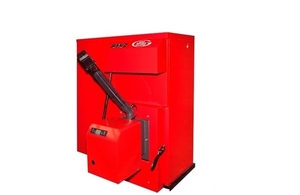Condensing Biomass Boilers qualify for domestic RHI
Condensing biomass boilers to qualify for the domestic Renewable Heat Incentive scheme

Condensing biomass boiler
Condensing biomass boilers will be eligible for the domestic Renewable Heat Incentive scheme, following confirmation from Government analysis that the risk from certain pollutants discharged from such boilers is minimal.
When the final domestic RHI policy was published in July 2013 it was announced that condensing biomass boilers would not initially be eligible for the domestic RHI.
This position, however, was subject to the result of tests being undertaken on behalf of Defra in order to properly assess the potential impact on water quality of polycyclic aromatic hydrocarbons (PAHs) being emitted in the condensate of this type of boiler.
PAHs are products of incomplete fuel burning and are categorised as priority hazardous substances under the EU Water Framework Directive.
Defra has confirmed that while a small amount of PAHs are released in the condensate from condensing biomass boilers the levels should not pose a significant threat to the aquatic environment once they have been through wastewater treatment.
The Government is therefore content to extend domestic RHI eligibility to condensing biomass boilers, provided they meet the other eligibility criteria of the scheme. This applies to eligible condensing biomass boilers installed between 15th July 2009 and the launch of the scheme in Spring 2014, as well as those installed after the launch of the scheme.
Eligibility criteria for RHI funding is set out in the policy document Renewable Heat Incentive: The first step to transforming the way we heat our homes.